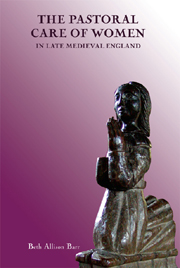Book contents
- Frontmatter
- Contents
- Miscellaneous Frontmatter
- Acknowledgments
- List of Abbreviations
- Introduction: “Be it husband, be it wife”
- 1 Pastoral Vernacular Literature
- 2 Pastoral Language
- 3 Pastoral Perceptions
- 4 Pastoral Care
- Conclusion: Gendered Lessons
- Appendix I The Manuscripts of Mirk's Festial
- Appendix II The Exampla of Mirk's Festial
- Bibliography
- Index
Introduction: “Be it husband, be it wife”
Published online by Cambridge University Press: 12 September 2012
- Frontmatter
- Contents
- Miscellaneous Frontmatter
- Acknowledgments
- List of Abbreviations
- Introduction: “Be it husband, be it wife”
- 1 Pastoral Vernacular Literature
- 2 Pastoral Language
- 3 Pastoral Perceptions
- 4 Pastoral Care
- Conclusion: Gendered Lessons
- Appendix I The Manuscripts of Mirk's Festial
- Appendix II The Exampla of Mirk's Festial
- Bibliography
- Index
Summary
IN HIS Festial, the most popular vernacular sermon compilation in late medieval England, clerical author John Mirk included an exemplum about a Devonshire vicar.
In Devonshire beside Axe Bridge there dwelled a holy vicar who had one in his parish, a woman, that lay sick at the point of death half-a-mile from him in town. This woman at midnight sent after him [the priest] to do her her rites. Then this man with all the haste that he could muster, rose up, and went to the church, and took God's body in a box of ivory, and put it in his pocket … And he rode toward this woman, and went over a meadow that was nearby. Then as he hurried on his way and without his knowing, the box shook out of his bosom, and fell down on the earth; and in the falling the box opened, and the host rolled on the green. Then, when he had shriven [confessed] this woman, he asked her if she would be houseled [partake in Eucharist], and she said, “Yes.” Then he put his hand in his bosom, and sought the box. When he found it not, he was very afraid, and said to the woman: “Dame, I shall fetch God's body with all possible haste.’ And so he came by a willow tree, and made from it a good stick, and made himself naked, and beat himself as fast as he might, until the blood ran down his sides, and said to himself thus: “You fool if you have lost your creator, you shall pay for it.” ...
- Type
- Chapter
- Information
- The Pastoral Care of Women in Late Medieval England , pp. 1 - 20Publisher: Boydell & BrewerPrint publication year: 2008

